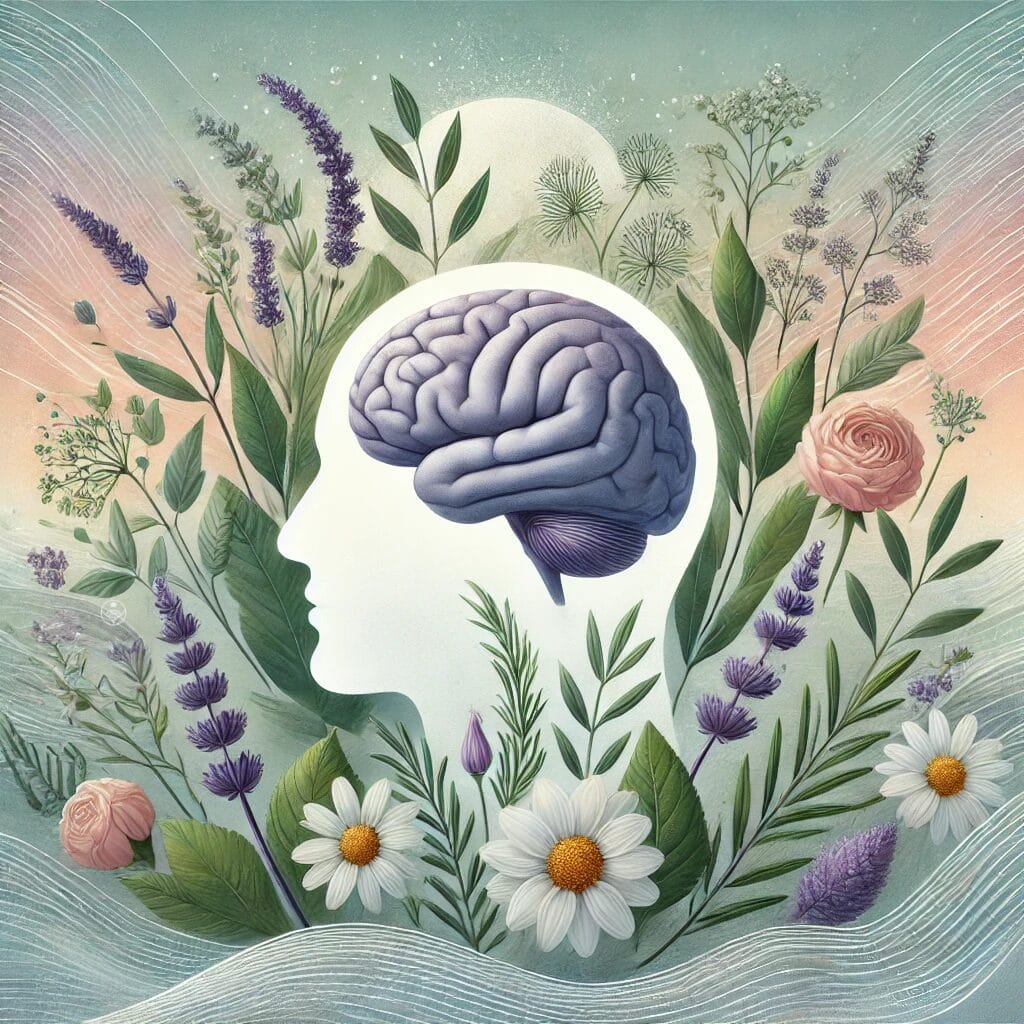
When you think about neurodivergence, whether it’s ADHD, autism, dyslexia, or something similar, herbs might not immediately spring to mind. However, these time-tested natural remedies have quietly found their way into teas, capsules, tinctures, and even Pinterest boards across the globe. Why, you ask? Well, it’s because herbs for neurodivergence might just offer support in ways you wouldn’t expect.
Now, let’s make one thing clear: we’re not claiming that herbs are some magical cure-all. After all, if they were, wouldn’t everyone already be sprinkling ashwagandha on their toast every morning? But, when incorporated into a broader holistic approach, herbs can offer subtle yet meaningful support for well-being, focus, and emotional balance. Additionally, while their effects might not be instant, that doesn’t mean they aren’t worth considering.
Ready to have your mind gently blown?
Unlock peak brain performance with science-backed biohacks. Join free now & get your guide for just £4.99 (45% off)!

Understanding Neurodivergence and Why Natural Support Matters
Neurodivergent brains often come with superpowers, like creativity, hyper-focus, or innovative problem-solving, but they also bring unique challenges. Hyperactivity, sensory sensitivities, difficulty with emotional regulation, and sleep disturbances are just a few examples.
While therapies, medications, and structured routines offer vital support, herbs can be a complementary piece of the puzzle. Think of them as a wise sidekick in your wellness journey, always there to help, never stealing the spotlight. And we’re about to dive into seven herbs that might just change the game.
The Magnificent Seven – Herbs for Neurodivergence
- Ashwagandha
- What it does: Known as the ultimate adaptogen, ashwagandha helps regulate cortisol (your stress hormone), making it ideal for managing sensory overload and stress-induced meltdowns.
- Backed by science? Yes! Studies have shown its potential to reduce anxiety and improve resilience in stressful situations.
- Where to find it: Often sold in capsules or powders, ashwagandha can be found in health food stores, specialty grocers, or online wellness retailers.
- Ginkgo Biloba
- What it does: This herb boosts blood flow to the brain, enhancing cognitive function and focus, music to the ears of anyone with ADHD.
- Backed by science? Absolutely. Research highlights its role in supporting memory and attention.
- Where to find it: Look for ginkgo in tablet or liquid extract form at major pharmacies, supplement stores, or online.
- Chamomile
- What it does: Your nan was right; chamomile is a gentle sedative that helps with restlessness, anxiety, and sleep troubles.
- Backed by science? Yes, chamomile has been studied for its calming effects and sleep benefits.
- Where to find it: Chamomile is everywhere, from supermarket tea aisles to loose-leaf teas at organic markets.
- Rhodiola Rosea
- What it does: This adaptogen helps boost mental stamina and reduce fatigue. It’s perfect for battling brain fog.
- Backed by science? There’s promising research, particularly in improving mood and energy levels.
- Where to find it: Typically sold as capsules or tinctures, you’ll find Rhodiola in health shops or online.
- Lavender
- What it does: The scent of lavender has a knack for calming the nervous system. Use it to unwind or as part of a sensory-friendly routine.
- Backed by science? Yes, lavender aromatherapy is widely recognised for reducing stress and promoting relaxation.
- Where to find it: Lavender oil is a staple in pharmacies, wellness boutiques, or online marketplaces.
- Lemon Balm
- What it does: A natural mood balancer, lemon balm can help with focus and emotional regulation. Perfect for anyone prone to mood swings or agitation.
- Backed by science? Research supports its calming and cognitive-enhancing properties.
- Where to find it: Available as a tea, tincture, or capsule in health stores and online.
- Passionflower
- What it does: Known for calming racing thoughts and improving sleep, passionflower can be a lifesaver for neurodivergent minds prone to insomnia.
- Backed by science? Yes, studies show it can help with sleep and anxiety.
- Where to find it: Passionflower tea and tinctures are readily available in health shops and online.
Are Herbs Really Backed by Science?
Peer-reviewed studies support these herbs, but they’re not miracle cures. It’s best to see them as part of a supportive ecosystem alongside diet, exercise, and mindfulness. If you want to explore further, check reputable sources like PubMed or your local university’s research library for the latest findings. You can also check out this article on herbs and Autism.
Herbs Aren’t For All, But They’re Close
While it’s tempting to treat herbs like the Swiss Army knife of remedies, they work differently for everyone. You might feel calmer sipping chamomile tea before bed, while someone else swears by lavender aromatherapy. The point is to experiment and see what aligns with your unique needs.
How to Get Started with Herbs
- Start small: Begin with one herb and track its effects.
- Go local: Check health stores, apothecaries, or even big retailers like Boots (UK), CVS (USA), or Chemist Warehouse (Australia).
- Try online: Many reputable online sellers offer these herbs in various forms, from teas to capsules.
- Watch this space: Soon, Herbal Biohacker will feature affiliate links to trusted suppliers, making it easier than ever to get high-quality herbs delivered to your door.
A Holistic Approach: Herbs for Neurodivergence as Part of the Bigger Picture
Herbs are just one piece of the neurodivergent wellness puzzle. Pair them with:
- A balanced diet full of omega-3s and antioxidants.
- Regular exercise, even if it’s a ten-minute walk.
- Mindfulness practices like yoga or meditation.
- Community support that makes you feel seen, heard, and valued.
Herbs as a Soothing Sidekick – Supporting Medication Side Effects
For many, medication plays a key role in managing neurodivergent traits. However, some of the side effects can feel like an unwanted houseguest. This is where herbs for neurodivergence can step in as a natural ally. They work like a supportive friend, offering comfort when life gets overwhelming.
Take ashwagandha, for instance. It is well known for regulating stress and balancing cortisol spikes, which often accompany stimulant medications. Similarly, chamomile has gentle calming effects. It may help ease insomnia or restlessness that sometimes comes with prescribed treatments.
In addition, herbs like lemon balm or passionflower promote relaxation and emotional balance. They can complement medication by smoothing out rough edges without interfering with its effectiveness.
That said, it’s always best to consult a healthcare professional before combining herbs with medications. They can ensure the mix works harmoniously, like a well-rehearsed duet, rather than clashing like an amateur garage band.
Conclusion
While it’s tempting to treat herbs like the Swiss Army knife of remedies, they can work differently for everyone. For example, it’s highly likely that you’ll feel calmer sipping chamomile tea before bed, whereas someone else might swear by lavender aromatherapy. Therefore, the key is to experiment and find what aligns best with your unique needs.
Ready to see where herbs fit into your life? Explore, experiment, and don’t forget to share your discoveries with us. Who knows, your journey might just inspire the next big idea in neurodivergent wellness.
***The information and tips provided are intended to support your wellness journey. However, we are not licensed healthcare professionals. We strongly recommend consulting with a qualified healthcare provider before making any changes to your health or wellness routine. Your health is a personal matter, and while we aim to offer guidance, we do not diagnose or provide medical treatment.***






